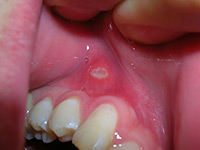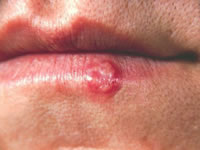One of your first questions if you have a nasty, painful mouth sore might be are canker sores contagious? Let’s settle that right now. No, they aren’t. Canker sores are not caused by a virus and you can’t spread them by kissing or sharing food or drink. Unlike cold sores, which are caused by a virus and highly contagious, canker sores cannot be spread elsewhere on your body or to another person.
What is the Difference Between Canker Sores and Cold Sores
Before you’re completely off the hook, however, you want to be sure what you have is a canker sore vs. a cold sore. Both canker sores and cold sores are quite common, they can be very painful and they can reoccur. Canker sores, also known as mouth ulcers, mainly appear inside the mouth – inner lips and cheeks, tongue, gums, and roof of the mouth. Cold sores are caused by a virus and appear on the outside of the mouth including lips and cheeks, and sometimes even in or under the nostrils.
You can also tell the difference between a canker sore and a cold sore by the way they look. Canker sores are shallow ulcers with a white or gray center and they are usually surrounded by a red border. You may get one or a small cluster and for some people they may reoccur frequently. While they are not contagious, some health professionals recommend that you avoid kissing when you have a canker sore because mouth ulcers are an easy way for bacteria and viruses to get in your body.
Cold sores, also known as fever blisters, are comprised of tiny inflamed fluid-filled papules, or blisters, that eventually crust over and form a scab. They are caused by the herpes simplex virus type 1 (HSV-1) and the lesions are extremely contagious until the sores completely heal. Cold sores usually burn and itch and the virus can be transmitted via direct contact with fluid from a cold sore. Sores typically heal in a week or so but the HSV-1 virus stays dormant in the body and may be re-triggered on occasion in some people by stress, illness, a tear in the skin or sunburn.
The cause of canker sores, on the other hand, is unclear and may be triggered by a variety of things including nutritional deficiencies, immune system problems, stress, minor mouth trauma like accidentally biting your tongue or inside cheek, aggressive brushing or dental work, poor oral hygiene, food allergies, and even hormonal changes. Some women get canker sores at certain points in their menstrual cycle. There is some evidence that heredity is a factor and outbreaks of canker sores sometimes run in families.
Canker Sore Relief
While you may be relieved to know that you don’t have to worry about canker sores being contagious, they can be very painful and annoying. While they will generally go away on their own in a week or so, they can be painful enough to interfere with eating and drinking at times. To help relieve the discomfort, there are numerous canker sore treatments you can try at home. You probably already have some of these remedies in your kitchen and medicine cabinet. Popular home remedies include warm water and salt rinses, dabbing milk of magnesia on the ulcers, topical anesthetics such as Anbesol, an oral patch like Cankermelts Medicated Discs
or an antimicrobial mouth rinse.
How to Prevent Them
If you have recurring canker sores you may want to check with your doctor to see if you have a vitamin deficiency or food allergy that could be triggering them. Here are some other steps you can take to help prevent canker sores in the future:
- Practice good oral hygiene including regular, gentle brushing and flossing and schedule regular dental visits
- Eat a well-balanced diet including lots of fresh fruit and vegetables to keep your immune system strong
- Look for foods that may be promoting your canker sores. For some, chocolate, coffee, acidic foods such as tomatoes, strawberries and pineapples, sugar and other foods may cause canker sores
- Choose a toothpaste and mouthwash without sodium laurel sulfate (SLS) such as Rembrandt Gentle White Toothpaste
and some formulas of Tom’s of Maine and Burt’s Bees toothpastes - Avoid smoking and other tobacco products
- Chew carefully and avoid chewing gum to help decrease the possibility of mouth trauma
Final Word
So now that question of whether canker sores are contagious is resolved, you can relax. While they are a minor annoyance there is generally no cause for concern. However, should you have a canker sore that doesn’t go away within two or three weeks, gets worse, is unbearably painful to the point where you can’t eat or drink, you should see your doctor.

